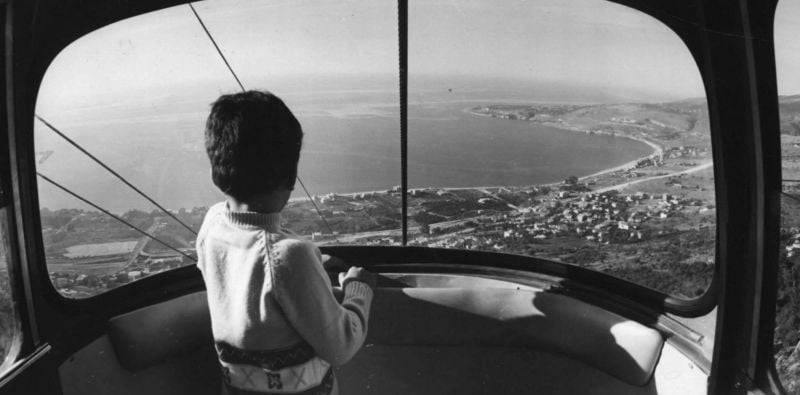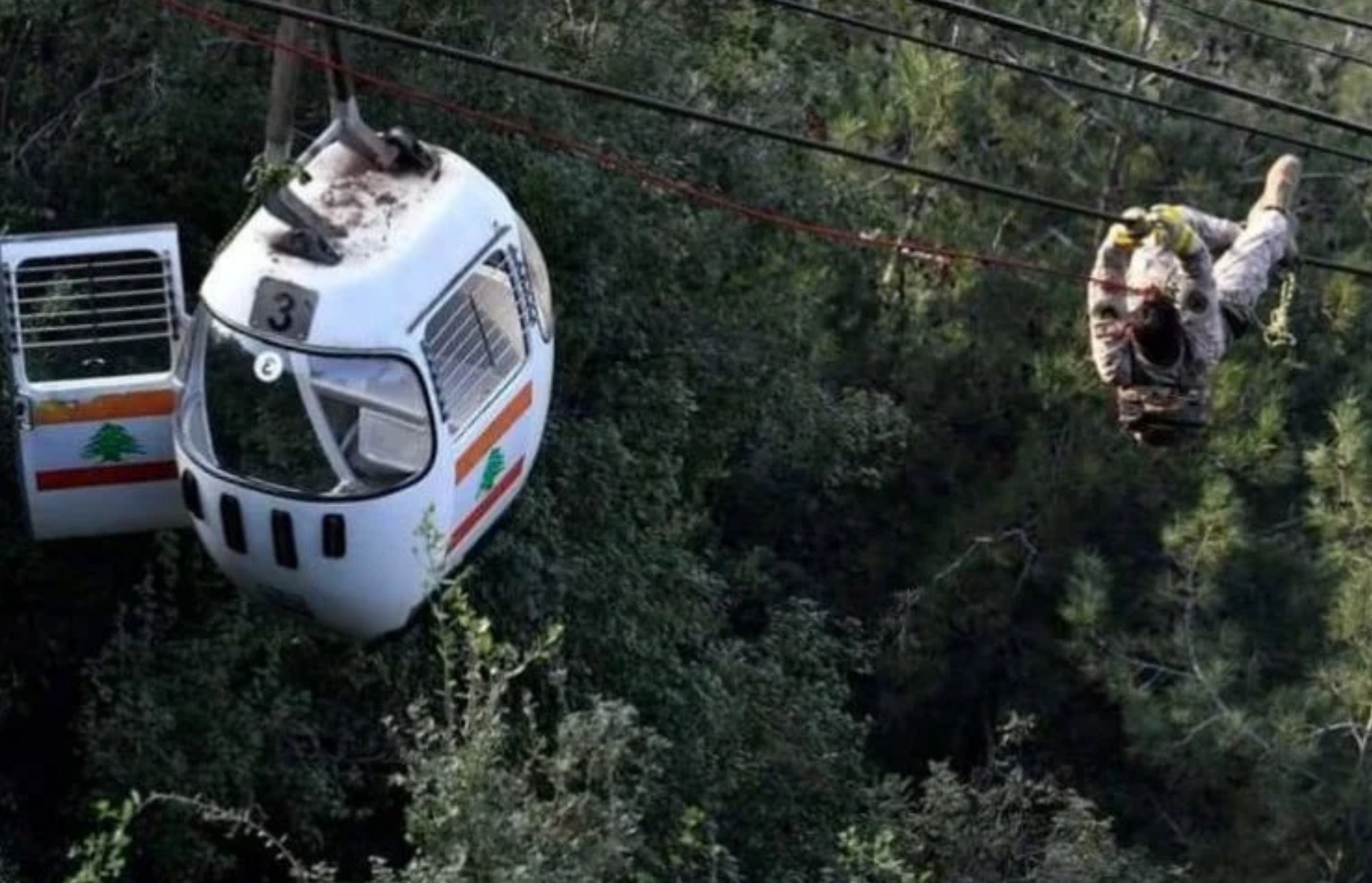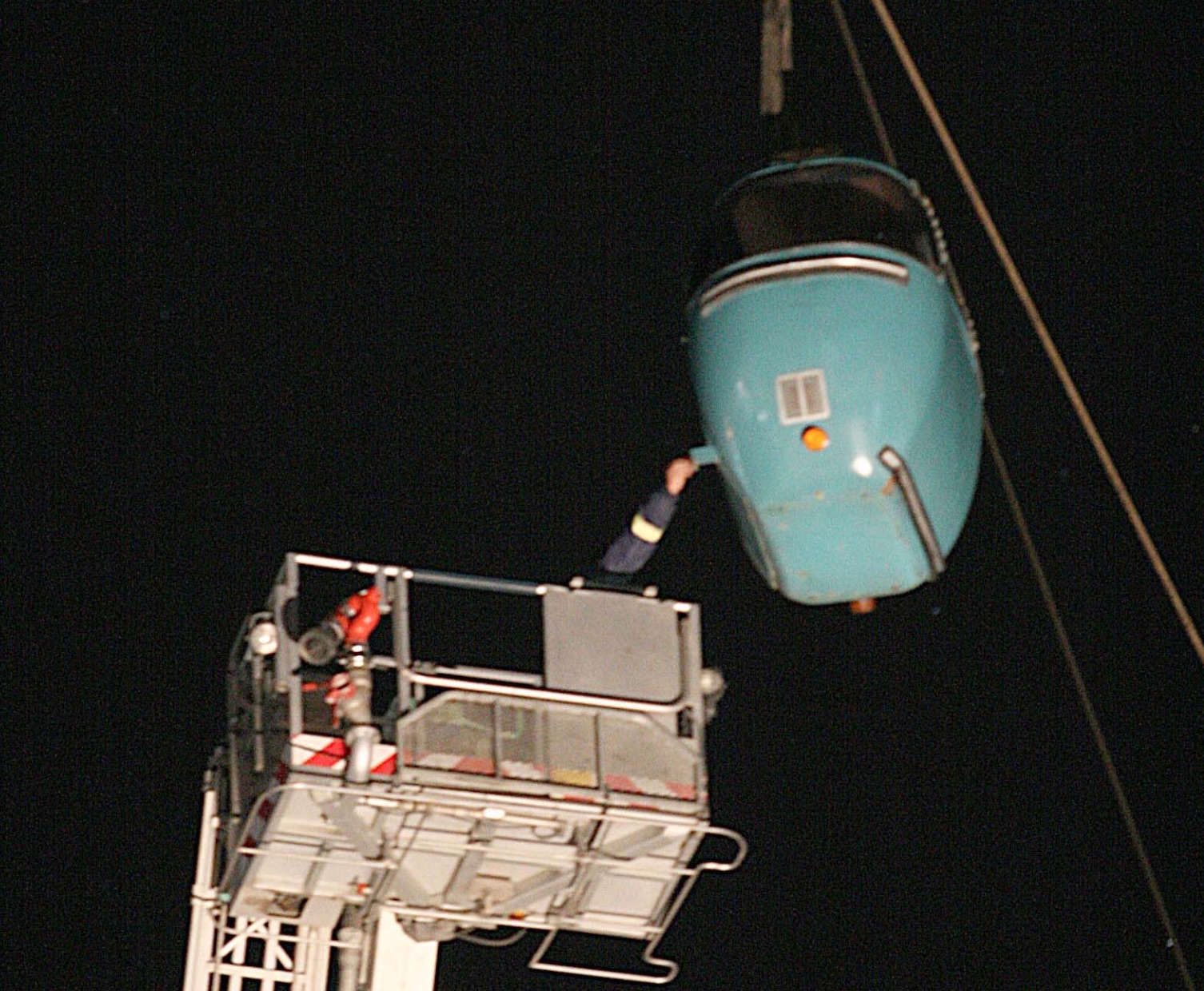
A child photographed inside a cable car in 1965, the year the service opened in Jounieh. (Credit: L'Orient-Le Jour archives)
On Dec. 28, 2023 it took more than five hours for the final passenger among the 44 suspended above Jounieh to reach solid ground. During this time, videos circulated on social networks showing passengers reciting prayers while awaiting rescue.
This incident sparked a controversy over the safety of the cable car service connecting coastal Jounieh to the heights of Harissa, where the Our Lady of Lebanon church and monument are located.
“After nearly 60 years of operation, and transporting over 14 million passengers, this is the first time the cable cars have experienced an incident of this magnitude,” said Joe Boulos, CEO of the Lebanese Cable Car and Tourist Development Company.
There have only been two, less serious, breakdowns in the past: the first occurred on March 2, 1989, when a couple was trapped for over ten hours, and the second on Feb. 21, 2007, when five people were stranded in two cabins for several hours.
The incident immediately drew reactions from caretaker Interior Minister Bassem Mawlawi, and Minister of Tourism Walid Nassar, even though the issue does not fall within their respective ministry’s remits.
Mawlawi criticized the cable car company for its “irresponsibility” and “lack of maintenance.” Nassar called for an “investigation” to determine the “responsibilities” of the managing company and Energy Ministry to which it reports.
Caretaker Energy Minister Walid Fayyad was also implicated, but he denounced the “media one-upmanship” of his colleagues. Like Boulos, Fayyad assured them that the transport system was well-maintained.
 On Dec. 28, 2023, 44 people were trapped above Jounieh for five hours, when a technical malfunction brought cable cars to a halt. (Credit: Mohammad Yassine/L'Orient-Le Jour)
On Dec. 28, 2023, 44 people were trapped above Jounieh for five hours, when a technical malfunction brought cable cars to a halt. (Credit: Mohammad Yassine/L'Orient-Le Jour)
This issue highlighted the company’s concession agreement, which would be discussed during a cabinet meeting on Friday.
Nassar told L’Oreint-Le Jour that the aim would be to set an appropriate framework to ensure the best possible situation for the state.
Since this is a concession granted in 1964 by the late President Fouad Chehab for a 50-year period, the cable car dossier is inherently tied to the Concessions Department under the Directorate General of Investments, falling under the Ministry of Energy.
“Initially, our concession agreement fell under the Ministry of Public Works and Transport,” Boulos explained. “Under a law passed in 2000, the concession, like the rest of the Concessions Department, shifted to the Ministry of Energy and Water.”
Originally extended for 11 years until 2025, and more recently extended again due to the COVID-19 pandemic, the concession agreement is now set to expire in May 2026.
“Today, it appears that the Ministry of Tourism is attempting to take control of our file. However, for such a decision to occur, it needs to be adopted by Parliament,” Boulos said.
Metal guide rod
“Our preliminary investigation, which we have forwarded to the energy minister indicates that the incident was caused by a metal cabin guide rod descending too closely to the hauling cable,” Boulos explained. “This caused the first cabin, as it descended toward Jounieh, to be blocked and collide with the next cabin.”
“This triggered the motor system of the cable car to brake and blocked the emergency motor,” he added. “After several unsuccessful attempts to restart it, we called in the civil defense, army, and Red Cross teams, all of whom responded to the scene promptly.”
Boulos added that he is still trying to comprehend the circumstances that led to this incident, “even though we check the state of the infrastructure every morning and conduct maintenance work on the cable every Monday [when it is closed].”
In response to the indiscriminate accusations regarding the state of the infrastructure and the alleged lack of maintenance, Boulos assured that the entire installation undergoes “rigorous examinations every year in February by the international firm Bureau Veritas-Halec, a benchmark in the field.”
“Following these examinations, they instruct us to make the necessary repairs and changes and issue us a certificate of compliance with international standards,” he said. “From the condition of the engine to that of the cable, not forgetting the pulleys, spreaders, pylons, and metalwork, we check for wear and rust.”
These inspections hold particular significance considering the age of the cable car, which went into service in 1965, a year after the concession was granted.
“It’s true that our installation is old, but that doesn’t mean it has to be replaced. If it’s well maintained, it’s still perfectly functional. Cable cars like ours, and even older ones, are still in use in Germany and Switzerland, for example,” said Boulos.
In a letter dated Jan. 9, 2024, and provided by the Ministry of Energy, Veritas-Halec notes that during its last inspection, “the inspection points carried out did not reveal any deterioration in the state of conservation of the equipment. As a result, there was no evidence to prevent the unit from continuing to operate until the next inspection, scheduled for 2024.”
It concludes that this incident “could not have been foreseen.”
Fares in dollar
The cable cars are at a standstill and will remain so for several weeks.
“We are trying to get the firm to come to Lebanon earlier than planned so that it can conduct its own investigation and draw the appropriate conclusions,” Boulos said.
Fayyad confirmed that this is an additional step that will enable the company to provide a final investigation report to the Ministry, awaiting the results of Veritas-Halec before taking a position. However, Boulos stressed, “the hypothesis of sabotage has now been ruled out.”
In the meantime, the company has already commenced some of the repair work to expedite the resumption of the cable car service to the public, aiming to achieve this objective before the end of February.
“It won’t happen before Bureau Veritas-Halec gives the green light,” Boulos said. “And I’ll be there in the first cabin to leave to prove that everything is fine.”
The safety of the cable car has been ensured since 1965.
“We have never skimped on maintenance work, nor on the safety of our cabins. We can’t afford to do things halfway,” Boulos said. “Either we start up the cable car and do it properly, or we close it down.”
This unwavering policy reportedly led the company to operate at a loss between 2020 and 2021, as it adapted to the economic crisis that has plagued the country since 2019.
While maintenance costs have remained constant over this period, the company’s revenues have sharply declined due to the depreciation of the Lebanese lira. The ticket price, fixed at LL9,000 pounds (then equivalent to $6 dollars) since 2014, remained denominated in the national currency until April 2023.
“Each time we requested a price revision from the Ministry of Energy to address the lira depreciation, the process took an extended period to be approved, reaching a point where it became outdated by the time it was finalized,” Boulos said.
During this period, rates were raised to LL25,000, LL50,000 (and LL70,000 for foreigners), and then to LL120,000 (LL300,000 for foreigners).
However, this proved insufficient given the volatility of the exchange rate.
“At one point, our tickets were worth between $0.7 and $0.9,” Boulos said.
Since the fares were set in dollars, tickets now cost $2.5 for Lebanese passengers and $6 for foreigners. Given the breakdown of passenger origin (almost two-thirds Lebanese and one-third foreign), the average ticket price is now around $3.5.
This adjustment has allowed the company to strengthen its financial position, and the state now receives more revenue from this concession.
“Following negotiations, we shifted from a fixed annual sum model to paying 2 percent of turnover to the state,” Fayyad explained.
Before the crisis, these payments amounted to just over $5,000, whereas by 2023, they will be equivalent to more than $23,000, according to figures of the Energy Ministry. This amount is expected to increase further with a rise in the company’s activity.
Before the crisis, the cable car carried an average of 400,000 passengers a year. This total was impacted from 2020 by the fall in purchasing power and the preventive measures linked to the pandemic.
 On Dec. 28, 2023, 44 people were trapped above Jounieh for five hours, when a technical malfunction brought cable cars to a halt. (Credit: Mohammad Yassine/L'Orient-Le Jour)
On Dec. 28, 2023, 44 people were trapped above Jounieh for five hours, when a technical malfunction brought cable cars to a halt. (Credit: Mohammad Yassine/L'Orient-Le Jour)
However, since 2022, the company has experienced a gradual recovery, with passenger numbers exceeding 300,000 a year.
“Based on our results up to September, we were expecting to reach the 400,000 passenger mark this year,” Boulos said. “However, with the outbreak of war in Gaza and the resurgence of tensions in South Lebanon, our business, like that of the entire tourism sector, has been severely affected.”
He, however, hopes to surpass this passenger threshold this year, despite the challenging start.
This article was originally published in French in L'Orient-Le Jour. Translation by Sahar Ghoussoub.
